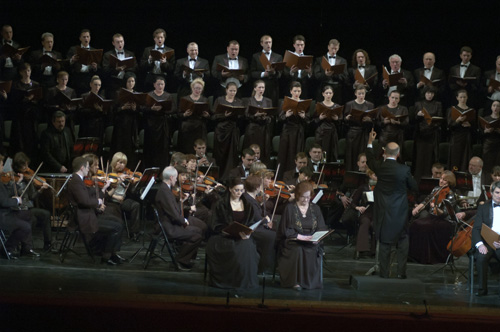A recent performance of Gustav Mahler’s massive Symphony No. 2, Resurrection reminded me of the deeply expressive content of the work, but it also showcased both the remarkable genius of the composer and the expertise of the conductor and musicians.
 Mahler’s artistic expertise is evident in the way he leads listeners through the work by placing emphases of varying importance along the way to create a coherent and meaningful expression, establishing perfect emphasis points in the music that never lose overall perspective of the entire 85-minute symphony.
Mahler’s artistic expertise is evident in the way he leads listeners through the work by placing emphases of varying importance along the way to create a coherent and meaningful expression, establishing perfect emphasis points in the music that never lose overall perspective of the entire 85-minute symphony.
Nothing is less real than realism…. It is only by selection, by elimination, by emphasis that we get at the real meaning of things.
~ Georgia O’Keeffe
The artistic challenge for a conductor is to be sure all of the inner points of emphasis are felt, but kept in perspective in relationship to the entire work. This is the only way the orchestra musicians and listeners can understand and fully experience the main emphasis point of the work—the joy of the “resurrection” in the 5th movement. As a result of this foresight, awareness, and an overall long-ranging viewpoint, this significant moment is even more meaningful and moving because of all that went before it. The artist learns to make choices based on what is of primary or secondary significance. Not all main emphasis points in music are at the end of a work, but in this symphony Mahler’s building of the emphasis points makes it inevitable that we are led to the transformative power of the finale.
A symphony must be like the world. It must contain everything.
~ Gustav Mahler

Choir and Symphonic Orchestra of the State Opera and Ballet Theatre in Dnepropetrovsk, Ukraine
Emphasis is important in all the communication we encounter every day. In order to be understood, it’s crucial that we consider what is most important and what is playing a more supportive role to the main point in a single conversation or series of conversations throughout a day or over time. We can all learn to use artistic sensibility in our interaction with others at home with our children or partners, at work with our colleagues, or in the community. Having goals is critical to making these decisions about emphasis.
 When you learn to use this concept you will:
When you learn to use this concept you will:
[sws_checklist]
- have greater clarity,
- take action that leads you forward,
- have greater focus,
- see progress, and
- be more accountable.
[/sws_checklist]
Remember that flexibility is important. It took Mahler six years to complete the 2nd symphony as he adjusted along the way in an effort to reach the main point of his work most effectively.
When I was growing up I always wanted to be someone.
Now I realize I should have been more specific.
~ Lily Tomlin
Composers and performing musicians make something more important by using techniques such as a sudden silence, a change in the flow of the music, a longer duration, a repeated note or figure or phrase, an extreme volume change, or a change in the number of performers from many to only a few or vice versa. We can all learn to use similar techniques as we explore the verbal communication we experience every day. Not everything is of equal importance. Being alert to how emphases are created and what they signify will help you recognize the most important moments, as well as the role of those that are more supportive and that move you to make your point or reach your goal effectively. Just like the composer, conductor, and orchestra musicians, it takes practice, but it is well worth the effort.
— Pat
